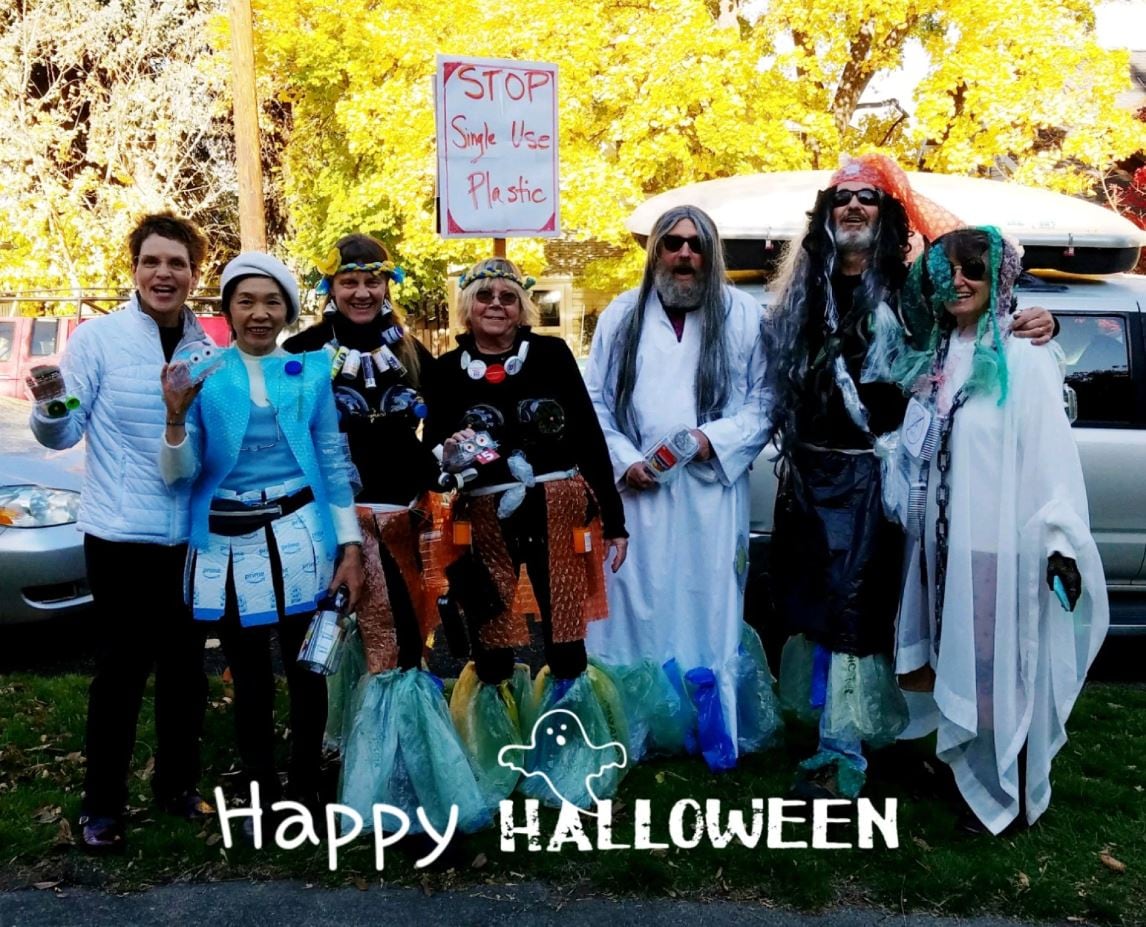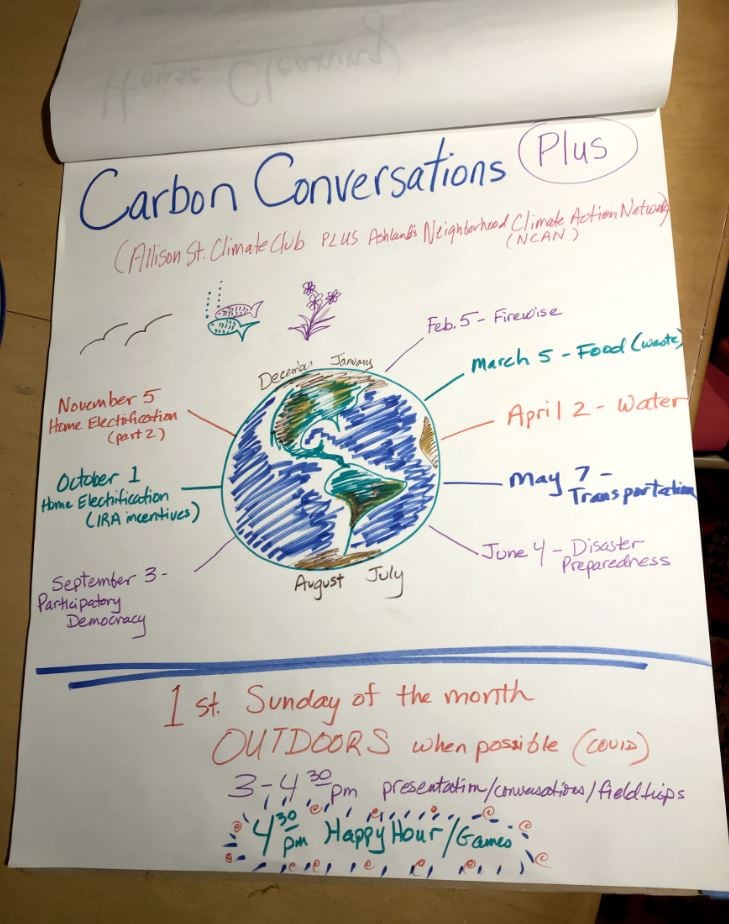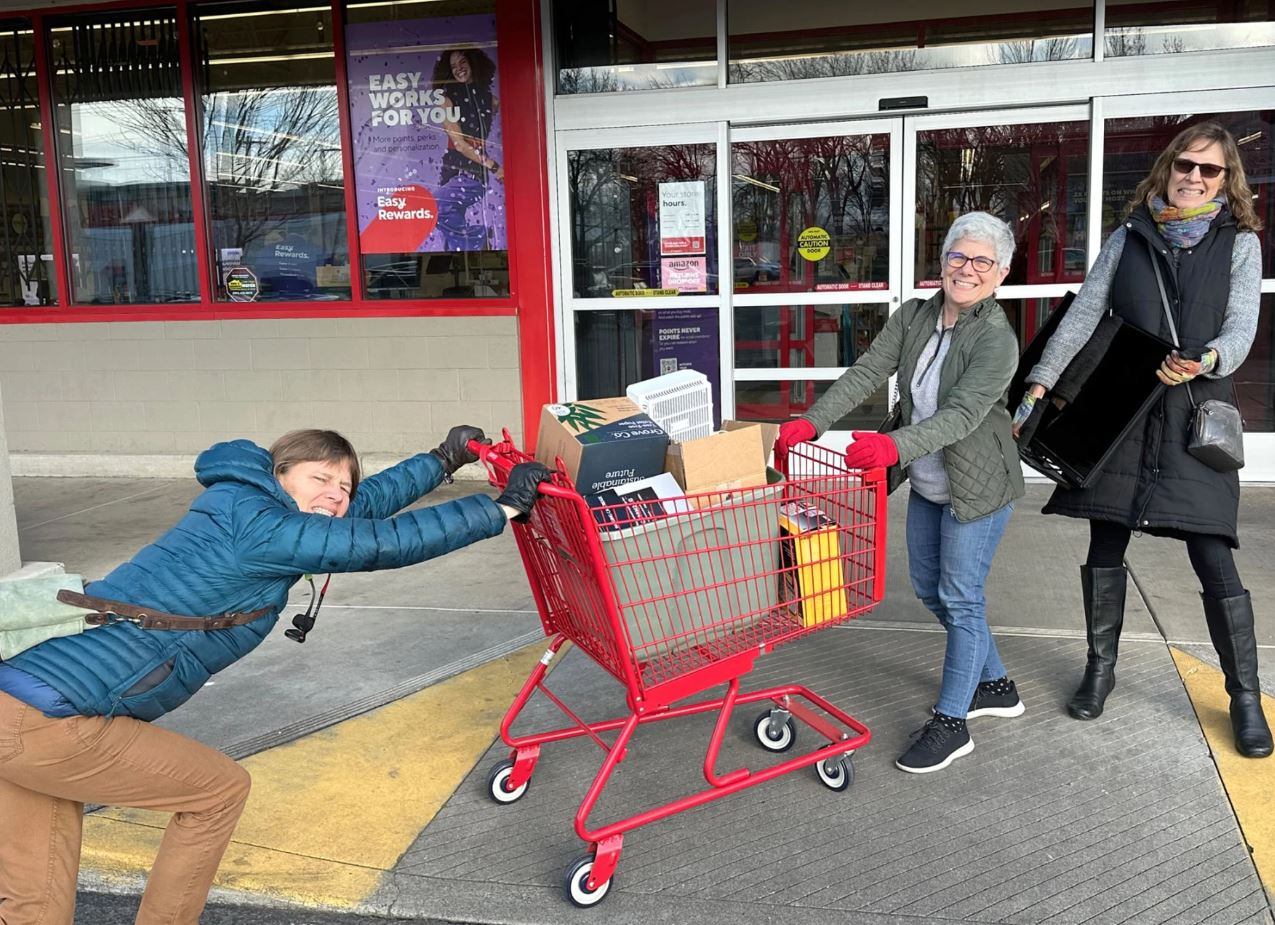

Published on: 05/04/2024
This news was posted by Oregon Today News
Description
On a Sunday afternoon in early March, nine neighbors gathered in Melody Noraas’ living room on Allison Street in Ashland, Oregon. Fat snowflakes were flying past the window of Noraas’ comfortable Craftsman, but no one seemed to notice; instead, everyone listened intently as each neighbor shared one change they’d like to make in their own lives to address climate change.
Sonya Daw talked about “electrifying” her home by replacing appliances that run on natural gas. Another neighbor voiced her concern about the health of the region’s rivers and watersheds.
“I’m a gardener and a cook; in this way I try to be conscious,” said Daniel Greenblatt.
“I have many issues,” Charlie Schelz, who is Daw’s husband, joked. After the laughter died down, his face grew serious. “It’s overwhelming to think about. Concentrating on the personal level is the way to keep my sanity.”
These neighbors, who have been meeting since 2019, call themselves the Allison Street Climate Club. Together, they’ve been learning how their everyday habits and choices can help reduce climate-warming emissions of carbon dioxide. Five years in, they’re still going strong, and their friends, other groups and even city officials are starting to take notice.
The seeds of an idea
The climate club started when Daw, a science writer and editor for the National Park Service, learned about Project Drawdown, a nonprofit that curates scientifically validated strategies for reducing carbon emissions. As Daw discovered, many of the strategies are related to food and agriculture — swapping out meat for a plant-rich diet, for example, or keeping food waste out of the landfill.
Inspired, Daw and Schelz invited several neighbors over for a potluck, where they had “half-silly, half-serious” conversations about which of the nearly 100 Project Drawdown solutions they felt motivated to explore.
“Everyone had something to say,” said Noraas, a retired educator. “The group gelled right away.” At the end of that first dinner, everyone wanted to know: What next?
They kept on meeting, eventually landing on single-use plastics — the ubiquitous “clamshell” containers; yards of bubble wrap; and wads of plastic bags that breed in overstuffed drawers — as an issue they could tackle together. That fall, they marched in Ashland’s Halloween parade wearing costumes crafted from plastic waste, carrying signs and chanting “Recycle, reduce, reuse; no more plastic use!”

They were having fun, but was it actually making a difference? During one of their early meetings, the group experienced what Daw calls their “wet blanket” moment.
“Someone commented that we’ve all been brainwashed into thinking that your individual actions and lifestyles are the problem,” said Daw. To really make a difference, the person continued, they should get involved with policy and politics.
In fact, fossil fuel companies have shrewdly shifted the onus of responsibility onto individuals via advertising campaigns and by promoting the concept of a personal “carbon footprint.” On the other hand, thinkers like author and scientist Katharine Hayhoe argue that anything that gets people talking about climate change, which for many is a politically charged topic, is constructive.
After careful consideration, Daw and her neighbors agreed: of course they should be involved politically — but equally important was walking the talk, learning together, and having fun along the way.
The COVID-19 pandemic threatened to sideline the group, but they continued meeting that summer, outside and socially distanced. Then, on Sept. 8, 2020, the Almeda Fire swept through parts of the Rogue Valley, destroying thousands of structures in Talent, Phoenix, and south Medford. Allison Street gained three new temporary residents whose homes had burned.
“It was a shock,” said Noraas. “It gave whole new meaning to climate change and global warming and smoke and devastation.”
Why Ashland may need to step up prescribed burns to manage dying Douglas firs
The club added emergency preparedness and the Firewise program, which strives to reduce the vulnerability of homes and neighborhoods to wildfire, to the list of topics to explore. In fall of 2021, they launched a monthly series they called “Carbon Conversations,” gathering outside and using old-fashioned flip charts to discuss water conservation, food waste, and electrification. Some meetings included “show and tell” with neighbors demonstrating worm composting or electric vehicles. Meetings usually ended with a list of brainstormed solutions — accessible, practical ideas, such as tracking weekly meat consumption or vowing to purchase blemished produce. At some point, they began capping their meetings with snacks and drinks. Anyone in the neighborhood is welcome, even if they just want to show up for the socializing.
“I think this is the closest the neighborhood has ever been, especially since we added happy hour,” said Pam Greenblatt, Daniel’s wife who handles communications for the group. The cohesiveness has taken on new meaning since the Almeda Fire and COVID, she added. “It’s good to know your neighbors, so if there’s a crisis we can help each other.”
The ripple effect
There are several groups in Southern Oregon focused on climate change, including Southern Oregon Climate Action Now (SOCAN), Rogue Climate, and Southern Oregon Food Solutions. Several cities are also developing strategies to reduce greenhouse gas emissions.
Early on, the Allison Street group reached out to people who could help educate them on different topics. But after a couple of years, “Something surprising and wonderful started to happen,” said Daw. “Strangers called me out of the blue to talk about climate action.” Among those were volunteers from the Ashland Climate Collaborative, which has formed action groups around a number of topics, including electrification, water conservation, composting, and transportation. Jim Hartman, a retired science teacher who heads the Neighborhood Climate Action Network for the collaborative, was especially eager to talk, as he had launched his own club in his neighborhood two-and-a-half miles across town on Clay Street and was trying to sprout new groups in Ashland.
“I was really lucky to have the Allison Street group to work with during our pilot year,” said Hartman. “People were isolated and didn’t know where to start.”
With input from the club and experts from around the valley, Hartman developed a year-long curriculum with PowerPoint slide presentations on topics ranging from water conservation and food waste to Firewise and “disruptive scenarios” like earthquakes. There’s even a unit on participatory democracy.

The Allison Street group followed Hartman’s curriculum in 2023, calling it “Carbon Conversations Plus” and adapting it to fit their style and goals. Hartman helped Ashland resident Flavia Franko start a group in her neighborhood last year, and he’s helping three new groups launch in 2024. Eventually, he’d like to expand beyond Ashland.
Finding group leaders hasn’t been easy, Hartman admitted. The job requires someone with a passion for the work who believes in the value of community, and who has the time and energy to commit. Sharing the load helps, and, as he sometimes reminds himself, “It doesn’t have to be perfect.”
Like the Allison Street neighbors, his Clay Street group builds in time to socialize and share food and drink. More than anything, the renewed sense of connection among neighbors is what keeps people coming back, said Hartman. “You find out you have some pretty cool people in your neighborhood.” With help, he has distributed a map of his block, flagging houses with residents who would need extra help evacuating during a disaster.
“I know if I needed anything I have six to eight people I could go to and ask for assistance and they would be there, and they know they could reach out to me,” he said.
Graphic novel ‘Wildfire’ encourages middle-grade readers to take action on climate change
Change starts at home
The Allison Street Climate Club doesn’t have many rules, but among their guiding tenets is that nobody is an expert, and anyone can lead a meeting.
To prepare for a meeting on reducing the risk of wildfire, Noraas invited Ashland’s fire marshal to come and evaluate her home — the least “firewise” one on the block, in her estimation. After her presentation, neighbors broke into groups and pointed out areas of concern: the wood piled against the side of the house; the wicker chair on her front porch; the leaves and other debris clogging the gutters. Noraas presented on Firewise again this year; in addition to addressing nearly every issue on her property, she and her neighbors have prepped “go bags” in case they ever have to evacuate.
The shared learning often leads to action. After Marci Gerston led a meeting on electronic waste, she, Daw, Noraas, and Pam Greenblatt took a field trip to Staples to deliver a cartful of used electronics collected from neighbors. Four households on Allison Street have traded out their natural gas furnaces for electric heat pump systems; Daw and Schelz now have an induction cooktop, and at least one household has installed an electric heat pump water heater.

This year, the group is looking at how they might extend their influence beyond their immediate neighborhood — lobbying area grocery stores to switch to refrigerants that emit fewer greenhouse gases is one idea they’re considering. For their March meeting, they invited Ashland City Councilor Bob Kaplan to talk about the city’s progress on its Climate and Energy Action Plan.
Groups like the Allison Street club are “useful to the city because you’re getting more and more of a critical mass on certain issues, like electrification,” said Kaplan. “People are talking to their neighbors.” The neighbors’ commitments to electrify, for example, dovetail with the activism of young people who, with the support of Rogue Climate, have been lobbying the city of Ashland to phase out natural gas in new construction.
Being part of the group has affected not only their own lives, but touched their friends and families, said Noraas.
Since her involvement in the Allison Street Climate Club, “both of my daughters have really upped their game. By doing what we’re doing and modeling it, it’s a much stronger way to influence other people than nagging.”
News Source : https://www.opb.org/article/2024/05/04/ashland-climate-club-branching-out/
Other Related News
05/18/2024
Tyson Fury 34-0-1 24 KOs faces Oleksandr Usyk 21-0 14 KOs where two of the top fighters in...
05/18/2024
Phoenix is the fastest growing city in Southern Oregon growing at a rate of 5 -- or 215 pe...
05/18/2024
Dear Amy I am a single woman in my mid-50s I never married or had children and like it thi...
05/18/2024
The Oregon Coast Trail trail system runs the length of Oregons 363-mile coastline arguably...
05/18/2024











